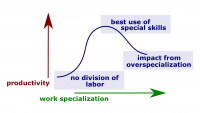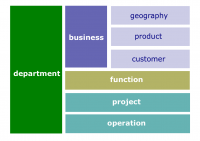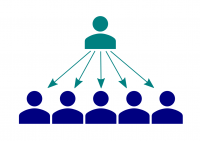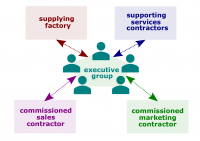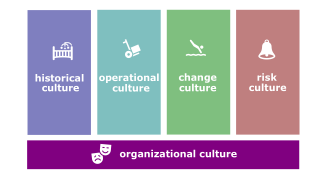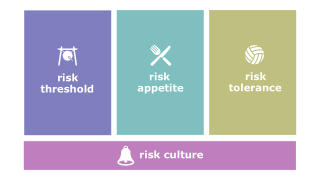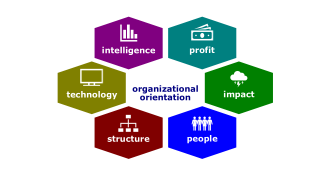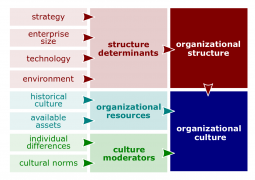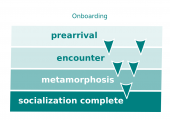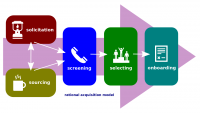OB culture concepts
OB culture concepts are those concepts that are related to organizational culture and, particularly, organizational structures, researched in organizational behavior studies. The concepts below are taken from Organizational Behavior by Robbins and Judge (17th edition); Septem Artes Administrativi served as the primary source of illustrations.
Organizational structure
- Organizational structure. The way in which job tasks are formally divided, grouped, and coordinated.
- Work specialization. The degree to which tasks in an organization are subdivided into separate jobs.
- Departmentalization. The basis by which jobs in an organization are grouped together.
- Chain of command. The unbroken line of authority that extends from the top of the organization to the lowest echelon and clarifies who reports to whom.
- Authority. The rights inherent in a managerial position to give orders and to expect the orders to be obeyed.
- Unity of command. The idea that a subordinate should have only one superior to whom he or she is directly responsible.
- Span of control. The number of subordinates a manager can effectively and efficiently direct.
- Centralization. The degree to which decision making is concentrated at a single point in an organization.
- Formalization. The degree to which jobs within an organization are standardized.
- Boundary spanning. When individuals form relationships outside their formally assigned groups.
- Simple structure. An organizational structure characterized by a low degree of departmentalization, wide spans of control, authority centralized in a single person, and little formalization.
- Bureaucracy. An organizational structure with highly routine operating tasks achieved through specialization, very formalized rules and regulations, tasks that are grouped into functional departments, centralized authority, narrow spans of control, and decision making that follows the chain of command.
- Functional structure. An organizational structure that groups employees by their similar specialties, roles, and tasks.
- Divisional structure. An organizational structure that groups employees into units by product, service, customer, or geographical market area.
- Matrix structure. An organizational structure that creates dual lines of authority and combines functional and product departmentalization.
- Virtual structure. A small, core organization that outsources major business functions.
- Team structure. An organizational structure that replaces departments with empowered teams, and which eliminates horizontal boundaries and external barriers between customers and suppliers.
- Circular structure. An organizational structure in which executives are at the center, spreading their vision outward in rings grouped by function (managers, then specialists, then workers).
- Mechanistic model. A structure characterized by extensive departmentalization, high formalization, a limited information network, and centralization.
- Organic model. A structure that is flat, uses cross-hierarchical and cross-functional teams, has low formalization, possesses a comprehensive information network, and relies on participative decision making.
- Innovation strategy. A strategy that emphasizes the introduction of major new products and services.
- Cost-minimization strategy. A strategy that emphasizes tight cost controls, avoidance of unnecessary innovation or marketing expenses, and price cutting.
- Imitation strategy. A strategy that seeks to move into new products or new markets only after their viability has already been proven.
- Technology. The way in which an organization transfers its inputs into outputs.
- Environment. Forces outside an organization that potentially affect the organization's structure.
- Institutions. Cultural factors that lead many organizations to have similar structures, especially those factors that might not lead to adaptive consequences.
Organizational culture
- Organizational culture. A system of shared meaning held by members that distinguishes the organization from other organizations.
- Dominant culture. A culture that expresses the core values that are shared by a majority of the organization's members.
- Organizational value. The primary or dominant value that is accepted throughout the organization.
- Organizational subculture. A miniculture within an organization, typically defined by department designations and geographical separation.
- Strong culture. A culture in which the core values are intensely held and widely shared.
- Organizational climate. The shared perceptions organizational members have about their organization and work environment.
- Ethical work climate. The shared concept of right and wrong behavior in the workplace that reflects the true values of the organization and shapes the ethical decision making of its members.
- Sustainability. Organization practices that can be sustained over a long period of time because the tools or structures that support them are not damaged by the processes.
- Institutionalization. A condition that occurs when an organization takes on a life of its own, apart from any of its members, and acquires immortality.
- Socialization. A process that adapts employees to the organization's culture.
- Prearrival stage. The period of learning in the socialization process that occurs before a new employee joins the organization.
- Encounter stage. The stage in the socialization process in which a new employee sees what the organization is really like and confronts the possibility that expectations and reality may diverge.
- Metamorphosis stage. The stage in the socialization process in which a new employee changes and adjusts to the job, work group, and organization.
- Ritual. A repetitive sequence of activities that express and reinforce the key values of the organization, which goals are most important, which people are important, and which are expendable.
- Material symbol. What conveys to employees who is important, the degree of egalitarianism top management desires, and the kinds of behavior that are appropriate.
- Positive organizational culture. An organizational culture that emphasizes building on employee strengths, rewards more than punishes, and emphasizes individual vitality and growth.
- Workplace spirituality. The recognition that people have an inner life that nourishes and is nourished by meaningful work that takes place in the context of community.
